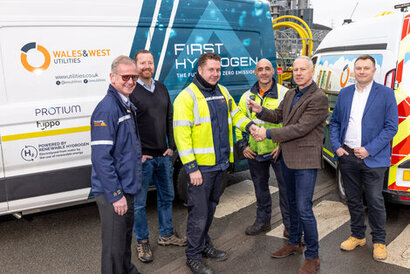
The insight collected halfway through the trials shows the advantages of the van's fuel cell powertrain in real world operation.
Data collected from onboard telematics, over a combined distance of 1,029 kilometers, show the first-of-its-kind vehicle has been operating for between 6 and 7 hours per day in temperatures of between 2°C and 17°C, without impacting range . The trials will continue to the end of the month and will cover one of the most demanding periods for WWU as winter weather increases emergency call outs.
This is a key performance indicator for many fleet operators exploring zero emissions vehicle solutions. Battery electric vehicles (BEVs) notably suffer with battery degradation in cooler or hotter climates. A 2023 study by the Norwegian Automobile Federation showed that BEVs running in colder weather dropped an average of 20 percent from WLTP range – which is calculated from the vehicle operating at 23°C without auxiliaries such as heating or air conditioning turned on. This can increase to a 40 percent drop for vehicles with older batteries or when heating or air conditioning are operating.
Such variation in range makes it challenging for fleet operators to effectively deploy BEVs in certain duty cycles. For organisations operating in cooler regions, such as south Wales, relying on predictable range expectations is business critical. WWU operates year-round to deliver vital gas network services for more than 7.5 million customers across Wales and the south west of England, and in winter months demands for its fleet vehicles to respond to gas emergencies and maintain the gas network are at their peak.
First Hydrogen has also demonstrated how its fuel cell’s powertrain delivers power, when needed, achieving outputs of 60kW in transient accelerations and in previous trials the vehicle has achieved a peak range of 630km (400 miles). This indicates the vehicle can manage more demanding duties for WWU, such as carrying heavier payloads, driving over hilly terrain or powering auxiliary equipment (onboard power).
“Thanks to the team at Wales & West Utilities, who have worked closely with our engineers, we have been able to collect more data from this deployment than in previous trials” said Steve Gill, Executive Director Automotive. “The trials are generating interesting insight we can use to update our Total Cost of Operation, which is key when securing purchase interest from prospective customers. One of the main complaints we hear from BEV drivers is the disparity between WLTP range and performance under real world conditions. The fact that our prototype vehicle is performing as expected during real life operations is a strong selling point for fleet operators and builds confidence in FCEVs.”
The trials with WWU are supported by Protium Green Energy Solutions and Hyppo Hydrogen Solutions. Together with First Hydrogen, they have created a hydrogen refuelling ecosystem to provide the infrastructure WWU needs for vehicle deployment.
“We are impressed with the performance of First Hydrogen's FCEV and the trials are giving us a real insight into the benefits and potential use of hydrogen vehicles in our fleet” added Stephen Offley, Transport Manager at Wales & West Utilities. “For fleet managers it is important to have a reliable and repeatable range so we can plan daily operations without adjusting for colder weather and building in more time for recharging. February is one of the coldest months in south Wales and one of WWU's busiest for emergency call outs, yet the cooler temperatures have not impacted the vehicle's ability to respond to all the engineer visits we need it to.”
For additional information:

